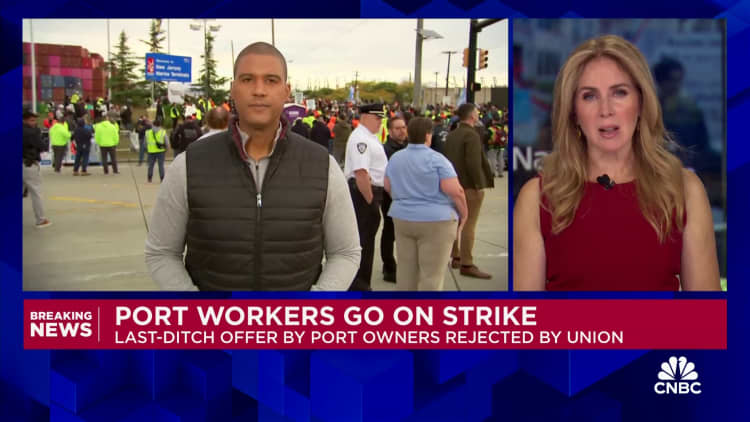Port of Miami dockworkers strike near the port entrance and demand a new labor contract, on October 1, 2024 in Miami, Florida.
Giorgio Viera | Afp | Getty Images
A dockworker strike at seaports along the U.S. East and Gulf coasts is expected to cause massive problems for global supply chains and the economy. American consumers will likely pay the price.
The International Longshoremen’s Association, or ILA, went on strike early Tuesday at 14 major ports over wage increases and use of automation. In all, the ports threatened with strikes handle $3 trillion annually in U.S. international trade, according to an analysis by The Conference Board.
“A disruption of this scale during this pivotal moment in our nation’s economic recovery will have devastating consequences for American workers, their families and local communities,” Matthew Shay, president and CEO of the National Retail Federation, said in a statement Tuesday. Supply chain dynamics are a key issue for the NRF, the retail industry’s largest trade association, especially ahead of the peak holiday season.
More from Personal Finance:
Here’s what the Fed rate cut means for your wallet
Don’t expect ‘immediate relief’ from the Fed’s first rate cut
Experts weigh in on when to refinance as interest rates fall
“American businesses, workers and families rely on the seamless flow of goods through these ports, and this strike will result in consumers ultimately paying higher prices due to limited supplies and greater demand for imported goods,” Shay said.
“After more than two years of runaway inflationary pressures and in the midst of recovery from Hurricane Helene, this strike will result in further hardship,” he said.
U.S. port strike could cause inflation
Overall, the U.S. economy has notched steady progress in lowering inflation, but in most cases price increases are only slowing — not falling outright.
The consumer price index, a key inflation measure that tracks average prices across a broad basket of consumer goods and services, increased 2.5% in August relative to a year earlier, according to the Bureau of Labor Statistics. That’s down from a pandemic-era peak of 9.1% in June 2022.
The cost of goods has been well controlled, with relatively stable commodity prices and — at least until recently — lower shipping costs, according to Lauren Saidel-Baker, an economist at ITR Economics.
However, “the port strike could cause renewed goods-side inflation,” she said.
The standoff between the ILA,…
Click Here to Read the Full Original Article at Top News and Analysis (pro)…


